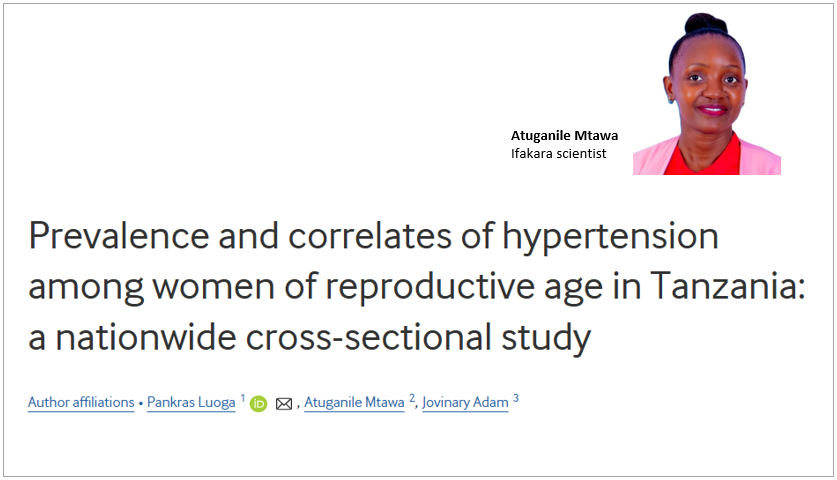
SURVEY: 1 in 9 Tanzanian women has undiagnosed high blood pressure

High blood pressure is increasingly rising in Tanzania, with a new national study showing that more than one in ten women of reproductive age are living with the disease — a trend scientists warn could increase cases of heart disease if left unaddressed.
Published on BMJ Public Health journal in October, the study reports that 11.2% of Tanzanian women aged 15-49 have hypertension. The condition is more common among older women, those living in urban areas, women who are separated, those from the wealthier households, and women who drink alcohol or smoke tobacco.
Local researchers lead the study
The study was conducted by Tanzanian researchers from leading institutions, including Pankras Luoga from Muhimbili University of Health and Allied Sciences, Atuganile Mtawa from Ifakara Health Institute, and Jovinary Adam, an independent researcher.
“Hypertension among the general population is increasing; however, its prevalence is inconsistently reported. This study helps policymakers to address the observed prevalence of hypertension among women of reproductive age in the country,” the researchers noted.
Using data from 7,610 women who participated in the 2022 Tanzania Demographic and Health Survey (TDHS), the scientists examined the prevalence and links of hypertension among women of reproductive age (15–49 years) in Tanzania.
Older, urban, wealthier women face higher risk
The study found age as the strongest predictor of hypertension. Women aged 35-49 were four times more likely to have high blood pressure compared to those aged 15–24.
Geography also played a role. Urban women had higher odds of developing hypertension than women in rural areas—a pattern researchers link to lifestyle changes such as reduced physical activity and increased consumption of processed foods.
Additionally, socioeconomic status also mattered. Women from the rich households were more likely to be hypertensive than those from poor or middle-income households.
Lifestyle factors strongly linked to hypertension
The study also identified several risk factors that increase the likelihood of hypertension. Women who were overweight or obese were about twice as likely to have high blood pressure. Alcohol consumption and tobacco use further increased risks, with smokers more than two times more likely to develop hypertension.
Separated women also faced higher odds of hypertension compared to married women, possibly due to stress and social factors.
Why these findings matter
Hypertension, often called a “silent killer” due to its lack of early symptoms, is a major risk factor for heart attacks, stroke, and kidney disease. The condition often goes undiagnosed, especially among younger adults who are not be routinely screened, and with more than 1 in 9 women of reproductive age affected, the researchers warn that the rising burden could undermine and strain the health system.
These finding highlights the need for the government and other health stakeholders to design health programmes that promote healthy lifestyles. On the other hand, the scientists call for targeted lifestyle interventions, such as reduced alcohol and tobacco use among women, and regular exercising in urban communities, where the burden is highest.
Read the publication, here.
